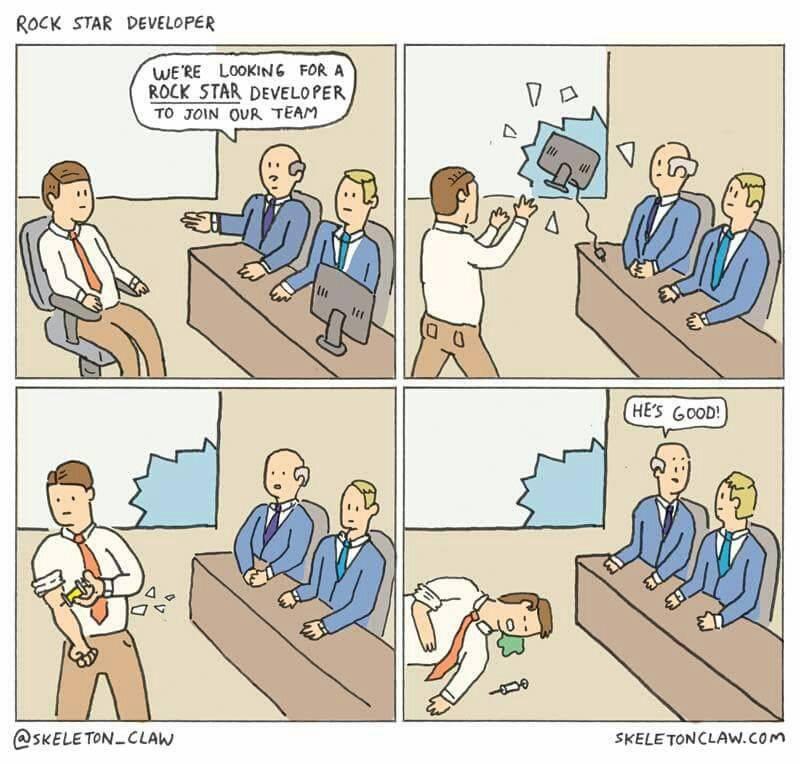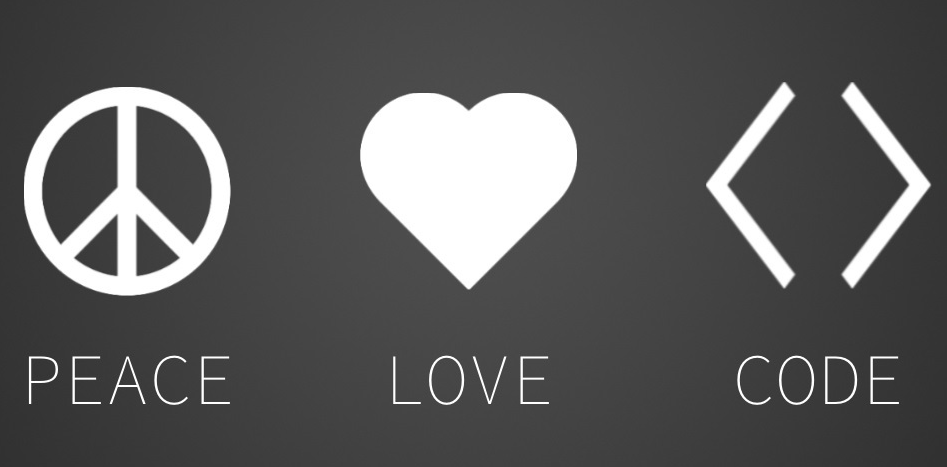Clone war or how to attract talent
I want to talk about the same "image of the employer." The last two months we at the bank (with the help of one large consulting company) spent on working on a project on this topic. A large team of several dozen experts solved an almost unsolvable problem: "How to make a bank as attractive as possible for the so-called" digital talents? "
As a result, a set of ideas and initiatives appeared, the implementation of which should help us significantly in achieving this goal. Whether we can change and become even cooler in the eyes of the candidates depends on whether we succeed in fulfilling everything planned. So follow us, there will be many changes.
But today I want to share with you my thoughts on hiring and keeping people.

What attracts a person when he looks at a potential employer? What really matters to him? How to interest him? The answer to these questions is the key to success.
A quick search on the net led me to an article by Daria Khokhlova, marketing director for Spice Recruitment. Here is her opinion on the topic (although I advise you to read the full article):
So what are developers interested in?

Daria’s opinion is one of many, there are a bunch of versions on the topic of “What do developers / testers / admins want (emphasize what is needed).” It seems to me that you can already shoot the second part of the famous film with Mel Gibson, replacing the word “women” in the title with “developers”. Success will be ensured.
I recall how I got a job at Raiffeisenbank. Frankly, he was a completely unattractive employer. HR arranged a hellish stress interview for me, the office was sloppy, and the company's strategy was unclear. At that moment, it was important for me to prove to myself that I was able to change something in such an environment.

It turns out that my motivation, in principle, came from a negative image of the employer? That is, I was looking for something that I call a "task-skeleton", and the bank came up completely. “There is one politics”, “there is boring and there is no dynamics”, “everything is out of date there, this swamp will drag you in” - quotes of this type were the softest of all that I heard from friends and acquaintances when I told them that I accepted the offer from bank. But in fact, it all really irritates and creates an atmosphere in which you want even more to prove to yourself and everyone around that there is nothing impossible. And my experience of the last 5 years has shown that I was right.
I read job descriptions for engineering positions at various banks. Now everyone is trying to describe the position, goals, objectives, format of work in the most lively and “human” way. I think that in a year the situation will even out and all major banks will have approximately the same “pretty” job description format. It turns out that the situation as a whole will not differ from that when all banks had boring and dry descriptions? For the candidate, everything will be the same.
And if you dig deeper, then all the banks will repeat one after another. Cool open space office? Everyone is trying to make it in a different form (ordering from the same designers, so often in the offices of different companies even the carpets are the same). Normal salaries to engineers? All this is already understood and sooner or later the market will normalize. Interesting tasks? Plus or minus banks dig in one direction.
Yes, someone puts a little more emphasis on innovation, someone managed to switch to new technologies faster than others, but in the future a few years will even out.
And do not forget about another idea that has so long been circulated in different communities - about averaging the composition and level of services, and therefore the banks themselves. If the client ceases to distinguish the difference, then the companies gradually become completely identical conductors of standardized services.
You know, even the slogans of companies are almost the same. Even logos .
What then is a differentiator? What distinguishes or should distinguish us from other banks in the eyes of candidates?

My answer is: hiring manager. I sincerely believe that the role / words / behavior of the hiring manager cannot be fully copied, and the candidate’s decision directly depends on them.
When I got a job in Rife, I had one more offer, from a rich oil company, with an office in the Kremlin area and interesting buns.
I came for an interview and saw a future leader who, having mumbled something like “dbrdn”, went into the phone with his head. I waited five minutes, then asked: “Maybe I should tell something?” He, without raising his eyes, answered - well, there’s a flipchart in the corner, draw the business process of X. I honestly drew - the dude never looked up from the phone. And the whole further “conversation” came down to the fact that he by all appearance showed his detachment and lack of involvement.
And at an interview in Raiffeisen, I saw interest, people listened to me, lively and directly talked about their problems and expectations. The comrades who hired me were open, looked into my eyes and did not ask me to draw squares that nobody wanted on flipcharts. They shared doubts. It was interesting with them, and ultimately this was the final argument in making the decision. And of course, I understood that with a high probability I was not expecting anything cool, and it was clear that, in general, the fears of my friends also had a basis, but at that moment something clicked in my head and I realized that it makes sense to take a chance . And I still think that the choice was the right one. And I am very clearly aware of the role of the hiring manager in this story.
Therefore, in the long run, any company that strives for talents needs to cultivate the competence of hiring personnel as one of the key ones. And when everything around will be similar, when logos and offices begin to merge in the eyes of the candidate, then it is the behavior of the hiring manager at the interview that will become the key difference.
What is your opinion?
Stay tuned!
As a result, a set of ideas and initiatives appeared, the implementation of which should help us significantly in achieving this goal. Whether we can change and become even cooler in the eyes of the candidates depends on whether we succeed in fulfilling everything planned. So follow us, there will be many changes.
But today I want to share with you my thoughts on hiring and keeping people.

What attracts a person when he looks at a potential employer? What really matters to him? How to interest him? The answer to these questions is the key to success.
A quick search on the net led me to an article by Daria Khokhlova, marketing director for Spice Recruitment. Here is her opinion on the topic (although I advise you to read the full article):
So what are developers interested in?
- Programmers like to solve technically challenging tasks.
- Programmers like to work with very smart people.
- Programmers like to look very smart.
- Programmers like to do open-source projects.

Daria’s opinion is one of many, there are a bunch of versions on the topic of “What do developers / testers / admins want (emphasize what is needed).” It seems to me that you can already shoot the second part of the famous film with Mel Gibson, replacing the word “women” in the title with “developers”. Success will be ensured.
I recall how I got a job at Raiffeisenbank. Frankly, he was a completely unattractive employer. HR arranged a hellish stress interview for me, the office was sloppy, and the company's strategy was unclear. At that moment, it was important for me to prove to myself that I was able to change something in such an environment.

It turns out that my motivation, in principle, came from a negative image of the employer? That is, I was looking for something that I call a "task-skeleton", and the bank came up completely. “There is one politics”, “there is boring and there is no dynamics”, “everything is out of date there, this swamp will drag you in” - quotes of this type were the softest of all that I heard from friends and acquaintances when I told them that I accepted the offer from bank. But in fact, it all really irritates and creates an atmosphere in which you want even more to prove to yourself and everyone around that there is nothing impossible. And my experience of the last 5 years has shown that I was right.
I read job descriptions for engineering positions at various banks. Now everyone is trying to describe the position, goals, objectives, format of work in the most lively and “human” way. I think that in a year the situation will even out and all major banks will have approximately the same “pretty” job description format. It turns out that the situation as a whole will not differ from that when all banks had boring and dry descriptions? For the candidate, everything will be the same.
And if you dig deeper, then all the banks will repeat one after another. Cool open space office? Everyone is trying to make it in a different form (ordering from the same designers, so often in the offices of different companies even the carpets are the same). Normal salaries to engineers? All this is already understood and sooner or later the market will normalize. Interesting tasks? Plus or minus banks dig in one direction.
Yes, someone puts a little more emphasis on innovation, someone managed to switch to new technologies faster than others, but in the future a few years will even out.
And do not forget about another idea that has so long been circulated in different communities - about averaging the composition and level of services, and therefore the banks themselves. If the client ceases to distinguish the difference, then the companies gradually become completely identical conductors of standardized services.
You know, even the slogans of companies are almost the same. Even logos .
What then is a differentiator? What distinguishes or should distinguish us from other banks in the eyes of candidates?

My answer is: hiring manager. I sincerely believe that the role / words / behavior of the hiring manager cannot be fully copied, and the candidate’s decision directly depends on them.
When I got a job in Rife, I had one more offer, from a rich oil company, with an office in the Kremlin area and interesting buns.
I came for an interview and saw a future leader who, having mumbled something like “dbrdn”, went into the phone with his head. I waited five minutes, then asked: “Maybe I should tell something?” He, without raising his eyes, answered - well, there’s a flipchart in the corner, draw the business process of X. I honestly drew - the dude never looked up from the phone. And the whole further “conversation” came down to the fact that he by all appearance showed his detachment and lack of involvement.
And at an interview in Raiffeisen, I saw interest, people listened to me, lively and directly talked about their problems and expectations. The comrades who hired me were open, looked into my eyes and did not ask me to draw squares that nobody wanted on flipcharts. They shared doubts. It was interesting with them, and ultimately this was the final argument in making the decision. And of course, I understood that with a high probability I was not expecting anything cool, and it was clear that, in general, the fears of my friends also had a basis, but at that moment something clicked in my head and I realized that it makes sense to take a chance . And I still think that the choice was the right one. And I am very clearly aware of the role of the hiring manager in this story.
Therefore, in the long run, any company that strives for talents needs to cultivate the competence of hiring personnel as one of the key ones. And when everything around will be similar, when logos and offices begin to merge in the eyes of the candidate, then it is the behavior of the hiring manager at the interview that will become the key difference.
What is your opinion?
Stay tuned!
